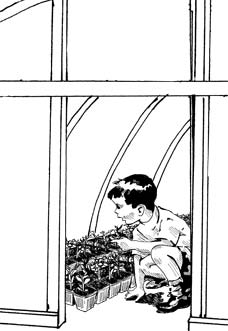 I was probably about seven or eight years old. My father stood at the door of a greenhouse full of Ilex. He stared straight ahead and asked me, “What color do you see?”
I was probably about seven or eight years old. My father stood at the door of a greenhouse full of Ilex. He stared straight ahead and asked me, “What color do you see?”
“Green?”
He nodded. “I see green, too.” He turned and looked me in the eye. “But I don’t see the same green you see. I see dollar-bill-green.” He took off down the narrow aisleway of the house, and I had to scramble to keep up. “Most people are in this business because they love plants, not because they love business.”
“But you love business?” I asked.
My father stopped in his tracks. “Darn right, I do. I appreciate plants and I like working with them, but if you can’t see past the green of the leaf to see the green of the money, you’ll never really succeed.”
I have since heard more than one nursery owner say things like that, but I think my father coined the phrase. At least, to me, it will always be his original thought and one of his defining character traits. I grew up realizing our company did not grow plants because they were pretty things that we love, but because they had value…and that the customer defines the value. We don’t grow a certain variety because we, as growers, like it or are interested in it or think it has merit. We only grow what our customers want; not what we want.
My father was always pretty critical of “hobbyists,” the growers who gushed and ooh-ed and ahh-ed over this cultivar or that. They were plant collectors, distracted and obsessed with the new and exotic just because they were new and exotic. Plant collecting, like any collecting, is a fine thing to do. But it’s no way to run a business. It’s not the way to make money with plants.
Time to grow up
Now, I’m the father. I’m the CEO, and it’s my turn to share business insights with my kids—and with you, too, I suppose.
Why? Why publish my thoughts here? All across the green industry—from growers to retailers to landscapers—there’s a wave of change. I see a young generation right behind me that will have to reinvent their businesses and rediscover how to make money with plants. I also see a generation approaching retirement, and they desperately want the next generation to succeed.
I see my peers and—more importantly—my customers facing a world that has already changed and is still changing quickly. It appears we, as a whole interconnected group, lack the required business acumen to really thrive in the midst of this change. This leaves us vulnerable to others who do have business acumen. And these people are probably not in our industry. They are not not nice people. They are not our friends. They wear suits and they “do deals” and they like mergers and they love to bankrupt lives and industries. And they don’t believe in the power of plants.
The Passion Paradox
Which brings us full circle. Growing plants improves the world. We make homes and communities more beautiful, healthier and just a better place to live. Plants bring peace and joy and so many other “hidden harvests” we could scarcely count them all. We are NOT talking about producing toner cartridges here. Not all things are created equal. Plants are special.
To grow plants, we must make a profit. Which means we must prioritize profit over the plants themselves. But if you are only concerned with profit, we could turn into greedy suits and forget the whole purpose of plants and all their “hidden harvests.” Must we choose between friendly plants and heartless capitalism? No way.
Please don’t think we need “balance.” I hate that word. Balance is bunk. We don’t need “balance.” We need purpose, to be totally imbalanced in the right direction, and able to shift our balance to get where we want to go.
The word we need is “purpose,” not “balance.” We are growing plants for a purpose. I want to make money on purpose, not by happy accident.
And I see far too many of us struggling. I see far too many busy, busy landscapers working themselves into the ground simply hoping that when things slow down in the winter they will have enough money to pay all their bills and maybe a little left over to take a vacation.
I see far too many of us working very hard for the wrong color green.
